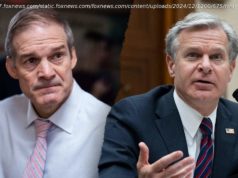Asked what’s behind bad relations with Russia, the nominee for secretary of state broke with Trump.
Donald Trump’s presidency has been shaped by two Russia storylines. One concerns investigations into Russia’s interference in the 2016 U. S. presidential election and possible ties to the Trump campaign. The other involves a deepening rift between Russia and the United States over issues beyond Russian meddling in democratic processes: everything from the Ukrainian and Syrian conflicts to nuclear-arms buildups and the poisoning of a former Russian spy. These storylines have at times intersected. But this week, in the wake of an FBI raid on the office of Trump’s longtime lawyer and a suspected chemical-weapons attack by the Russian-backed Syrian government, they have collided in dramatic fashion.
First the president tweeted at Russia that America would soon be firing missiles at its “Gas Killing Animal” of an ally in Damascus despite Russian vows to shoot them down, only to tweet hours later that there “is no reason” for U. S.-Russian relations to be so dysfunctional and that “much of the bad blood with Russia is caused by the Fake & Corrupt Russia Investigation, headed up by the all Democrat loyalists, or people that worked for Obama.”
Mike Pompeo, Counterpuncher
Then came the confirmation hearing of Mike Pompeo, the president’s pick to be the next U. S. secretary of state.
During his appearance before the Senate Foreign Relations Committee on Thursday, Pompeo, who currently leads the Central Intelligence Agency, repeatedly endorsed tough U. S. policies to counter Russian aggression abroad. “We need to push back in each place that we confront them and by every vector,” including not just military force but cyber and economic power, he said. But he refused to comment on the Russia probes at home, explaining that he wished to avoid that “minefield” since as CIA director he cooperated with Special Counsel Robert Mueller and the House and Senate inquiries. He declined to answer questions about whether Trump had asked him to interfere with then-FBI Director James Comey’s investigation and whether Trump would be abusing his power by firing Mueller or Deputy Attorney General Rod Rosenstein, as speculation this week suggests he might do now that the special counsel’s probe is moving closer to the president.
Perhaps the most revealing exchange came when the Democratic Senator Jeanne Shaheen asked Pompeo if he agreed with Trump that the “Fake & Corrupt Russia Investigation” is the source of the bad blood between America and Russia. “The historic conflict between the United States and the Soviet Union, now Russia, is caused by Russian bad behavior,” he responded, breaking with his boss.
When Pompeo then deflected questions about Trump’s hostility to the Russia investigations, noting that “I came here today to talk about my qualifications to be the secretary of state,” Shaheen argued that that’s precisely what she was asking him to do. She cited Pompeo’s observation in his prepared statement to the committee that Russia constitutes “a danger” to the United States and that “years of soft policy toward” Russia are “now over.” And yet, Shaheen said, “the president tweets out his opinion that the problem with Russia is Bob Mueller…. It’s hard for me to understand how we can have a secretary of state who is able to go to Russia and come to Congress and talk about the challenges and the threats that Russia [poses] to our democracy when we have this conflicting position from the president of the United States, who you would work for.”
Pompeo acknowledged that the Trump administration has yet to fully implement congressionally mandated sanctions to punish Russia for its intervention in the 2016 election. “Vladimir Putin has not yet received the message sufficiently, and we need to continue to work at that,” he said. Still, he pointed out, the Trump administration is countering Russia not just with sanctions but also by investing in its nuclear arsenal, battling Russian mercenaries in Syria, and expelling unprecedented numbers of diplomats and intelligence officers from the United States.
Those actions, Shaheen retorted, “get undermined by a president who consistently refuses to hold Vladimir Putin accountable for what Russia has done to the United States. That presents a challenge as we go into the 2018 elections, and it presents a challenge as we work with other democracies around the world.”
The hearing was notable for a number of reasons; most significantly, Pompeo said he thought Trump had the authority to launch punitive strikes against Syria without congressional authorization, indicated that Trump will likely withdraw from the Iran nuclear deal in May if European parties to the agreement can’t come up with ways to fix it to the president’s liking, and offered a surprisingly narrow definition of U. S. goals for Trump’s planned summit later this spring with North Korean leader Kim Jong Un. The purpose of the meeting with Kim is to set conditions for an agreement in which North Korea “will step away from its efforts to hold America at risk with nuclear weapons, completely and verifiably,” he said, hinting that fully eliminating the North Korean nuclear threat, as opposed to just the threat to the United States from North Korea’s long-range nuclear weapons, was a more distant objective.
But most remarkable was the way in which the two Russia stories overlapped, highlighting the most prominent example at the moment of how America’s tumultuous domestic politics is influencing its foreign policy. The one time Pompeo did weigh in on the Russia investigations, he told the Democratic Senator Chris Coons that he wouldn’t resign as secretary of state if Trump dismissed Mueller or Rosenstein in order to block the inquiry. “My instincts tell me that my obligation to continue to serve as America’s senior diplomat will be more important at increased times of political, domestic turmoil,” he said. “Having not given it a great deal of thought, I’m confident that that’s the path that I would take.”
“Well, Director Pompeo,” Coons responded, “I’d urge you to give it some thought.






